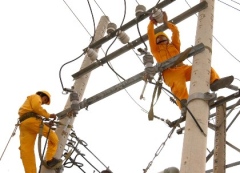Power supplier wants more price increases

At a recent review conference on power saving in HCMC, Loc said industrial manufacturing sectors, especially steel and cement, consumed as much as 47 per cent of the total power output.
But the prices of power sold to steel and cement manufacturers are currently lower than the average electricity price by VND160-195 a kilowatt.
Loc said the government should thus increase power prices while maintaining price support mechanisms for poor and low-income households.
He said the government should also direct enterprises to innovate production technology and equipment, especially those working in power-consuming industries like steel, cement and chemicals, as well as prohibit imports of equipment that consumes a lot of electricity.
Another concern is that after the recent increase in gas prices, consumers have been switching to electric cookers, putting more pressure on EVN.
According to Deputy Minister of Industry and Trade Hoang Quoc Vuong, in the future, the government would no regulate power, coal and fuel prices.
Until then, any power increase would be weighed carefully.
“The power industry is reassessing costs and determining how much market prices have fluctuated and there is yet any specific figure at present,” Vuong said. “We should keep in mind that the power sector still owes hefty debts in 2010 and 2011, so power increases should be approved to improve the financial situation of the industry,” Vuong said.
EVN has an unsettled loss of VND15 trillion (US$723.2 million) due to exchange rate fluctuations, the State Audit said last month.
EVN’s losses in 2011 were caused by unfavorable production conditions as it purchased power at high prices and sold it below costs, coupled with lax management of investment and finance.
There is also a potential loss of VND12 trillion ($578.6 million) if coal and gas prices are properly calculated in accordance with market prices and sufficiently included in production costs.
EVN raised electricity prices by 5 per cent last December, which was the second increase in 2011. The average power tariff is now VND1,304 per kilowatt-hour.
The group will restructure its business this year and withdraw its investments in real estate, stock and banking sectors.
EVN targets a total electricity generation of 118.5 billion kilowatt-hours in 2012, including 67.62 billion kilowatt-hours purchased from providers outside the group.
It posted losses of VND10.16 trillion in 2010.
Currently, local gas and coal suppliers are complaining that prices of their commodities sold to EVN are lower than production costs.
EVN has been allowed to delay payment of trillions of dong of debt owed to the Vietnam Oil and Gas Group and the Vietnam Coal and Mineral Industries Group until the next power price increase.
What the stars mean:
★ Poor ★ ★ Promising ★★★ Good ★★★★ Very good ★★★★★ Exceptional
Related Contents
Latest News
More News
- State corporations poised to drive 2026 growth (February 03, 2026 | 13:58)
- Why high-tech talent will define Vietnam’s growth (February 02, 2026 | 10:47)
- FMCG resilience amid varying storms (February 02, 2026 | 10:00)
- Customs reforms strengthen business confidence, support trade growth (February 01, 2026 | 08:20)
- Vietnam and US to launch sixth trade negotiation round (January 30, 2026 | 15:19)
- Digital publishing emerges as key growth driver in Vietnam (January 30, 2026 | 10:59)
- EVN signs key contract for Tri An hydropower expansion (January 30, 2026 | 10:57)
- Vietnam to lead trade growth in ASEAN (January 29, 2026 | 15:08)
- Carlsberg Vietnam delivers Lunar New Year support in central region (January 28, 2026 | 17:19)
- TikTok penalised $35,000 in Vietnam for consumer protection violations (January 28, 2026 | 17:15)

 Tag:
Tag:




















 Mobile Version
Mobile Version